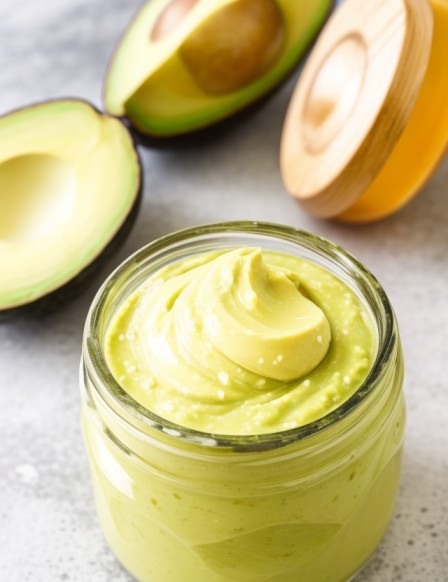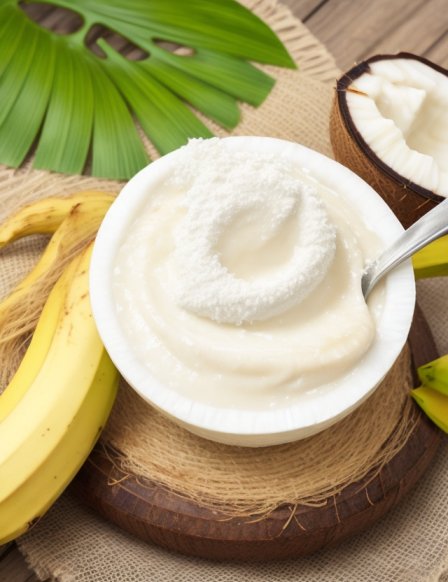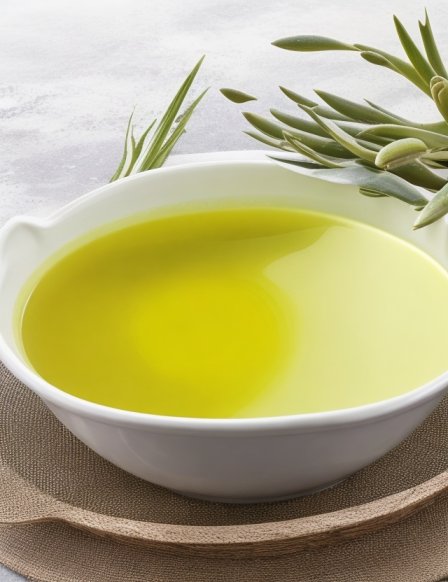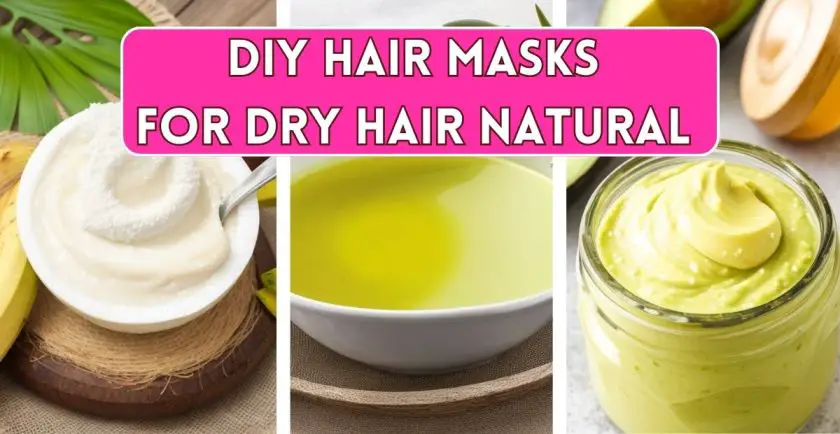Dry hair can be a common and frustrating problem for many people. Factors such as overwashing, excessive heat styling, and exposure to environmental elements can strip the hair of its natural oils, leaving it dry, dull, and prone to breakage. However, fear not, as there are natural remedies to restore hydration and vitality to your hair. One of the most effective and budget-friendly solutions is creating DIY hair masks tailored to combat dryness. In this blog, we’ll explore three powerful DIY hair masks for dry hair: Avocado and Honey Hair Mask, Coconut Milk and Banana Hair Mask, and Olive Oil and Aloe Vera Hair Mask. Embrace these nourishing treatments, and you’ll be on your way to luscious, well-hydrated locks.
Understanding Dry Hair:

Dry hair is a common hair condition characterized by a lack of moisture and natural oils in the hair strands. It can lead to a variety of issues such as frizz, split ends, and a dull appearance. Understanding the causes and characteristics of dry hair can help you identify the best solutions to address this concern effectively.
Characteristics of Dry Hair:
Dry hair exhibits certain observable characteristics that can help identify the condition:
- Lack of Shine: Dry hair often lacks the natural shine and luster that healthy, well-hydrated hair possesses. Instead, it may appear dull and lifeless.
- Frizz and Flyaways: Dry hair is prone to frizz and flyaways, making it difficult to manage and style.
- Brittle and Prone to Breakage: Dry hair is more susceptible to breakage and split ends, as it lacks the flexibility and strength that well-moisturized hair possesses.
- Rough Texture: When you run your fingers through dry hair, you might notice a rough, coarse texture, indicating the lack of moisture in the hair shaft.
Common Causes of Dryness:
Several factors can contribute to dry hair, including:
- Excessive Washing: Frequent washing of hair, especially with harsh shampoos, can strip the scalp and hair of natural oils, leading to dryness.
- Heat Styling: Regular use of hot tools like hairdryers, straighteners, and curling irons can cause moisture loss and damage to the hair cuticles.
- Environmental Factors: Exposure to sun, wind, and dry air can deplete the hair’s moisture, particularly in arid or harsh climates.
- Chemical Treatments: Chemical processes like coloring, bleaching, and perming can weaken the hair structure and contribute to dryness.
- Overuse of Hair Products: Some hair products, like styling gels, hairsprays, and mousses, contain alcohol and other drying agents that can dehydrate the hair.
Why Natural Hair Masks are Effective:
Natural hair masks, especially those created with DIY ingredients, are effective for combating dry hair due to several reasons:
- Moisturizing Properties: Natural ingredients used in DIY hair masks are rich in essential fatty acids, vitamins, and minerals that provide deep hydration to the hair strands. They replenish lost moisture and help restore the hair’s natural balance.
- Nourishing Nutrients: Natural ingredients like avocado, coconut oil, honey, and aloe vera contain nutrients that promote hair health and repair damaged hair cuticles.
- Chemical-Free: DIY hair masks do not contain harsh chemicals or sulfates that can further strip the hair of its natural oils and worsen dryness.
- Customization: DIY hair masks allow you to tailor the ingredients to suit your specific hair type and concerns. This customization ensures that your hair receives the precise care it needs.
- Cost-Effective: DIY hair masks are often more affordable compared to store-bought products, making them a budget-friendly option for regular hair care.
The Benefits of DIY Hair Masks:
- Avoiding Harmful Chemicals in Commercial Products: Commercial hair care products often contain harsh chemicals, sulfates, parabens, and synthetic fragrances that can strip the hair of its natural oils and cause damage over time. By creating DIY hair masks, you have complete control over the ingredients used, ensuring that your hair receives only natural and beneficial elements. This reduces the risk of exposure to harmful chemicals, making it a safer and healthier option for your hair.
- Tailoring Ingredients to Suit Your Hair’s Needs: Each person’s hair is unique, and different hair types require specific care. With DIY hair masks, you can tailor the ingredients to suit your hair’s specific needs and concerns. For example, if you have dry hair, you can opt for ingredients like avocado, honey, and coconut oil that offer deep hydration. If your hair is oily, you can use ingredients like lemon, tea tree oil, and clay to balance excess oil production. Customizing the hair mask allows you to address your hair’s individual requirements and see more effective results.
- Cost-Effectiveness of Homemade Hair Masks: Purchasing high-quality hair care products can be expensive, especially if you need to address specific hair concerns. DIY hair masks offer a budget-friendly alternative, as many of the ingredients used can be found in your kitchen or local grocery store at a fraction of the cost. Creating your own hair masks can also save you money in the long run, as the quantities you make are usually sufficient for multiple applications.
- Nutrient-Rich Ingredients for Optimal Hair Health: DIY hair masks often incorporate natural, nutrient-rich ingredients that promote hair health. These ingredients are packed with vitamins, minerals, and antioxidants that nourish the hair from root to tip. For instance, ingredients like avocado provide essential fatty acids and vitamin E for deep hydration, while bananas offer potassium and vitamin B6 to strengthen the hair. The combination of these natural nutrients can result in improved hair texture, shine, and overall health.
- Environmentally-Friendly Approach: Making your own hair masks reduces your reliance on commercially packaged products, which can lead to excessive plastic waste and environmental pollution. By choosing DIY hair masks, you can contribute to a more sustainable and eco-friendly approach to hair care. Additionally, many natural ingredients used in DIY hair masks are biodegradable, further reducing their impact on the environment.
- Empowering Self-Care and Creativity: Preparing and applying DIY hair masks can be a relaxing and enjoyable self-care activity. It allows you to take a moment for yourself, pamper your hair, and unwind from daily stress. Experimenting with different ingredients and combinations also encourages creativity, as you discover which masks work best for your hair and personal preferences.
3 DIY Hair Masks for Dry Hair
1. Avocado and Honey Hair Mask for Deep Hydration:

Benefits of Avocado for Hair: Avocado is a powerhouse of nutrients, including vitamins A, E, and D, which deeply nourish and moisturize the hair. Its natural oils help strengthen the hair shaft and reduce breakage.
Benefits of Honey for Hair: Honey is a humectant, meaning it attracts and retains moisture. It aids in locking in the hair’s natural hydration and provides a natural sheen.
Recipe: To make the Avocado and Honey Hair Mask, mash one ripe avocado and mix it with two tablespoons of organic honey until you achieve a smooth paste.
Application: Apply the mixture generously to your damp hair, focusing on the ends. Massage the mask into your scalp to stimulate blood flow. Leave it on for 30 minutes to an hour, then rinse thoroughly with lukewarm water.
Frequency: Repeat the Avocado and Honey Hair Mask once a week for optimal results. Store any leftovers in the refrigerator for up to three days.
2. Coconut Milk and Banana Hair Mask for Nourishment:

Benefits of Coconut Milk for Hair: Coconut milk is rich in healthy fats and proteins that nourish the hair and promote overall scalp health. It acts as a natural conditioner, leaving your hair soft and manageable.
Benefits of Banana for Hair: Bananas are loaded with vitamins and minerals like potassium and vitamin B6, which strengthen the hair and prevent split ends.
Recipe: For the Coconut Milk and Banana Hair Mask, blend one ripe banana with half a cup of coconut milk until you get a creamy mixture.
Application: Apply the mask evenly through your hair, from the roots to the tips. Cover your hair with a shower cap and let the mask sit for 45 minutes before rinsing it out thoroughly.
Frequency: Use the Coconut Milk and Banana Hair Mask once or twice a month to keep your hair well-nourished and moisturized.
3. Olive Oil and Aloe Vera Hair Mask for Moisture:

Benefits of Olive Oil for Hair: Olive oil is an excellent emollient, providing intense moisture to dry and damaged hair. It also helps to tame frizz and adds shine.
Benefits of Aloe Vera for Hair: Aloe vera contains enzymes that promote hair growth and improve scalp health. Its moisturizing properties help repair and condition dry hair.
Recipe: For the Olive Oil and Aloe Vera Hair Mask, combine two tablespoons of olive oil with three tablespoons of fresh aloe vera gel.
Application: Massage the mixture into your hair and scalp, ensuring complete coverage. Leave it on for 30 minutes before rinsing it off with a mild shampoo and cool water.
Frequency: Apply the Olive Oil and Aloe Vera Hair Mask every two weeks to keep your hair hydrated and rejuvenated.
Also Read-
- Simple Homemade Face Mask Recipes
- 7 Tips for Keeping Your Skin Hydrated and Fresh During Long Flights
Tips for Maximizing the Effectiveness of Hair Masks:
Hair masks are a fantastic way to nourish and rejuvenate your hair but to get the most out of them, follow these tips to ensure optimal results:
- Prepare Your Hair for the Mask: Before applying the hair mask, wash your hair with a gentle shampoo to remove any dirt, oil, or product buildup. This helps the hair mask penetrate better and allows the active ingredients to work effectively.
- Apply the Hair Mask Correctly: Divide your hair into sections and apply the hair mask evenly from the roots to the ends. Make sure to saturate each strand with the mask to ensure full coverage and maximum benefits.
- Cover and Heat Your Hair: To enhance the effectiveness of the hair mask, cover your hair with a shower cap or wrap it in a warm towel. The added warmth creates a steam effect, opening up the hair cuticles and allowing the nutrients to penetrate deeply.
- Duration of the Treatment: Follow the recommended duration mentioned in the hair mask recipe. Leaving the mask on for the specified time ensures that the ingredients have enough time to work their magic without causing any adverse effects.
- Avoid Overuse: While hair masks can be highly beneficial, using them too frequently may lead to product buildup and weigh down your hair. Stick to the recommended frequency, usually once a week, to strike the right balance.
- Rinse Thoroughly: After the treatment time, rinse the hair mask thoroughly with cool or lukewarm water. Avoid using hot water, as it can strip away the mask’s beneficial properties and natural oils from your hair.
- Follow Up with a Mild Shampoo: Some DIY hair masks contain natural oils or ingredients that may leave a residue on the hair. Follow up with a mild shampoo to ensure that your hair is clean and free from any excess mask.
- Consider Overnight Application: For an intensive treatment, you can apply the hair mask before bedtime and leave it on overnight. Cover your hair with a soft towel or use a silk pillowcase to avoid any mess while sleeping.
- Consistency is Key: For noticeable and lasting results, use hair masks consistently. Incorporate them into your hair care routine and stick to a schedule that works for you.
- Tailor Masks to Your Hair’s Needs: Experiment with different DIY hair mask recipes and adjust the ingredients to cater to your specific hair concerns. Whether it’s hydration, repair, or volume, customizing the masks can deliver better outcomes.
By following these tips, you can make the most of your DIY hair masks, ensuring your hair receives the care it deserves. Proper application, duration, and consistency will lead to healthier, softer, and more manageable tresses that shine with natural beauty.
Note-
The information provided in this article is for educational and informational purposes only. The DIY hair masks and natural remedies discussed may not be suitable for everyone. Before trying any of the hair mask recipes or implementing changes to your hair care routine, we recommend consulting with a qualified healthcare or hair care professional. Individual hair types, allergies, and sensitivities can vary, so it is essential to perform patch tests and exercise caution when using new ingredients on your hair or skin. To read more about health and safety considerations, please visit our health disclaimer page. Always prioritize your safety and well-being when trying new hair care practices.
FAQs (Frequently Asked Questions)
1. Q: What are DIY hair masks?
DIY hair masks are homemade treatments made from natural ingredients that provide nourishment and hydration to dry hair. They are an excellent alternative to commercial hair products filled with chemicals.
2. Q: How often should I use a DIY hair mask for dry hair?
For most hair types, using a DIY hair mask once a week is sufficient. However, if your hair is severely dry or damaged, you can apply it twice a week until you see improvements.
3. Q: Can I leave the hair mask on for longer than the recommended time?
It is not advisable to exceed the recommended duration, as some ingredients may cause adverse effects if left on for too long. Follow the instructions to achieve the best results.
4. Q: Can I apply a DIY hair mask to my scalp as well?
Yes, you can apply the mask to your scalp but focus mainly on the hair strands. Massaging the scalp can improve blood circulation and enhance the mask’s effectiveness.
5. Q: Can I store leftover hair masks for future use?
Yes, you can store unused portions of the hair mask in an airtight container in the refrigerator. However, try to use it within two to three days to ensure freshness.
6. Q: Can I use multiple DIY hair masks in one week?
It’s generally safe to use different DIY hair masks during the week, but avoid overloading your hair with too many treatments. Stick to a schedule that allows your hair to breathe between applications.
7. Q: Are DIY hair masks suitable for all hair types?
Yes, DIY hair masks can be customized to suit various hair types, including dry, oily, curly, and damaged hair. Choose ingredients that cater to your specific hair concerns.
8. Q: Can I apply a DIY hair mask on color-treated hair?
Yes, many DIY hair masks are gentle and suitable for color-treated hair. However, avoid masks that contain ingredients that might interact negatively with your hair color.
9. Q: Can men use DIY hair masks as well?
Absolutely! DIY hair masks are suitable for all genders and hair types. Men can benefit from these natural treatments to improve hair health and appearance.
10. Q: Can I use a DIY hair mask if I have a sensitive scalp?
If you have a sensitive scalp or any known allergies, perform a patch test before applying the hair mask to your entire scalp. Some ingredients may cause irritation in sensitive individuals.
Conclusion:
With the power of natural ingredients, you can bid farewell to dry, lifeless hair. The Avocado and Honey Hair Mask, Coconut Milk and Banana Hair Mask, and Olive Oil and Aloe Vera Hair Mask are excellent choices to restore moisture, shine, and manageability to your locks. Embrace these nourishing DIY hair masks for dry hair and witness the transformation of your tresses into healthy, vibrant, and hydrated masterpieces. So, next time you find yourself grappling with dry hair, remember the magic words: DIY Hair Mask for Dry Hair!

